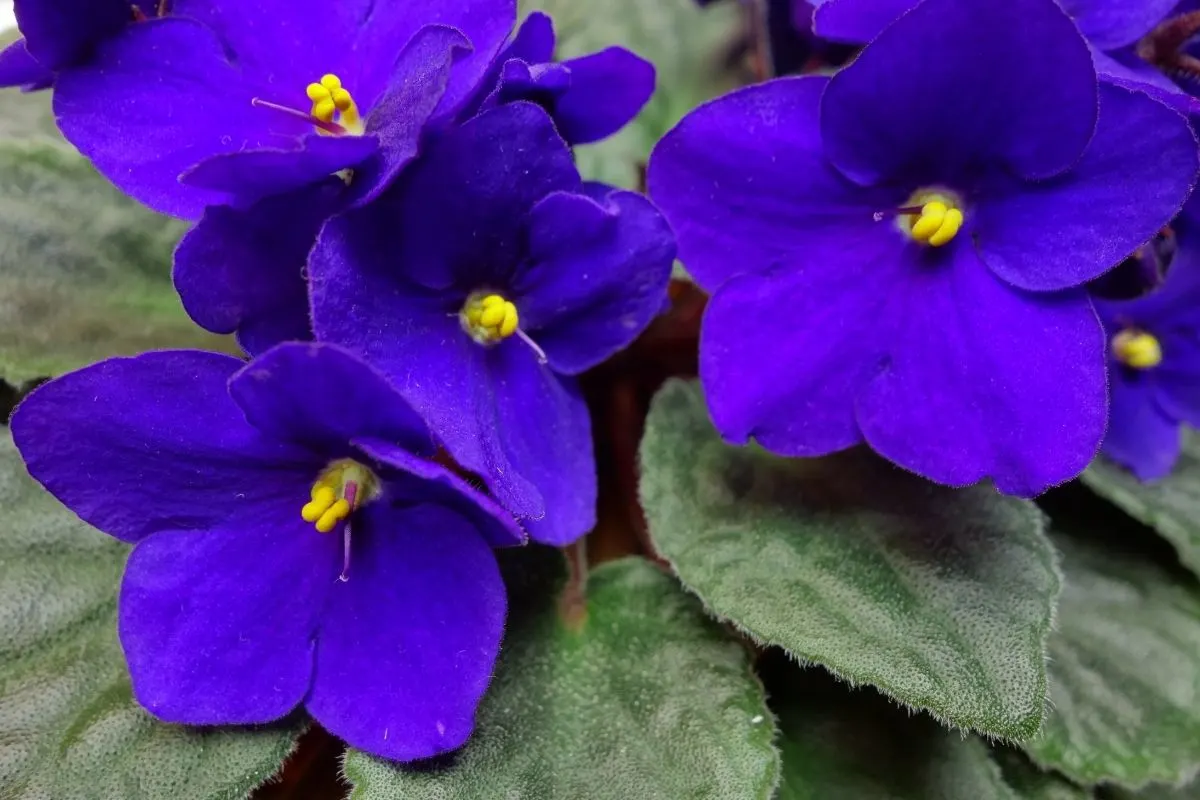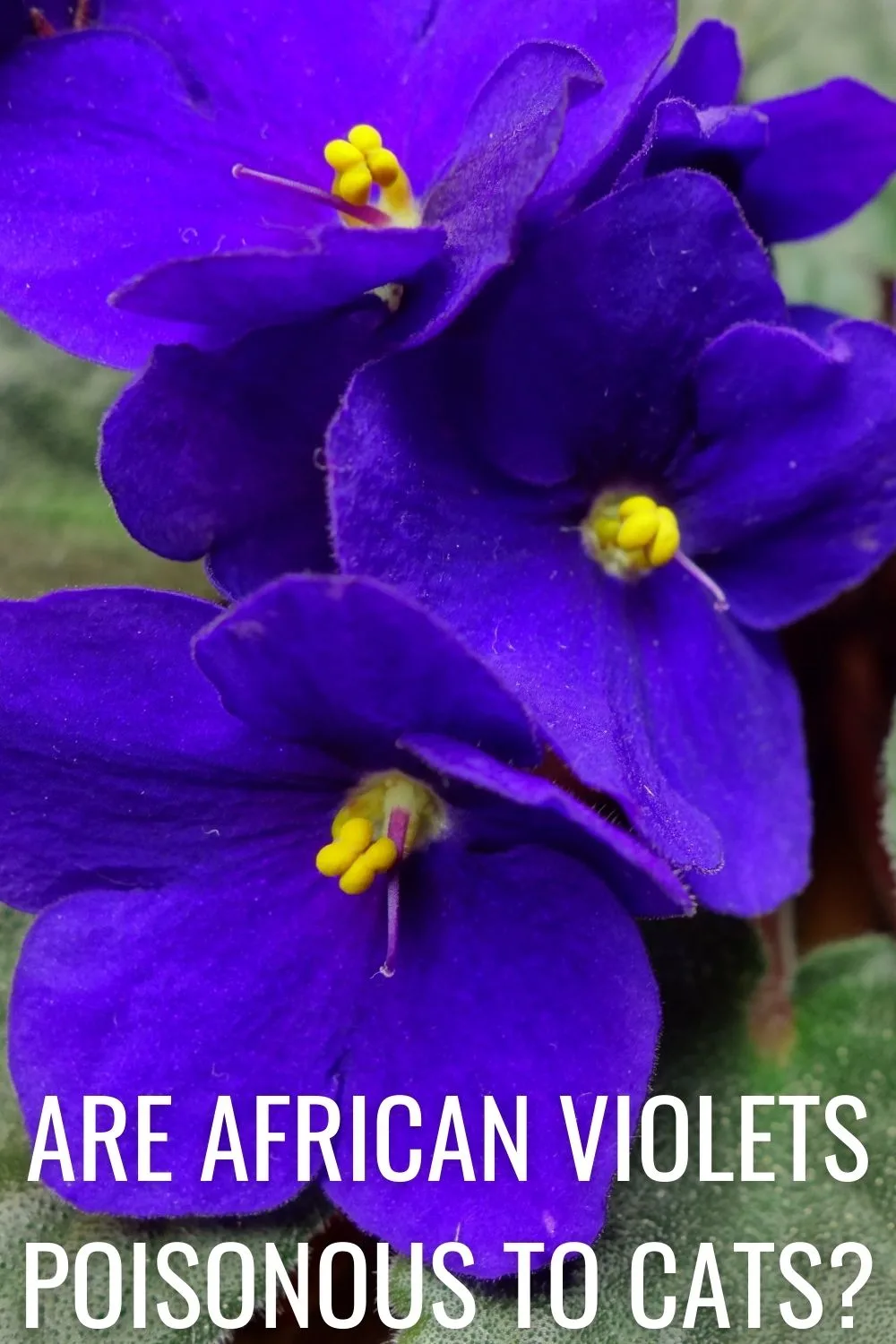African violets are one of the most popular houseplants throughout the world. Their fuzzy leaves and velvety flowers are attractive and brighten up a room. They are also popular plants to use in raised planters around porches in many climates. If you have a cat, you might wonder: are African violets poisonous to cats?
African violets are not poisonous to cats. This fact has been endorsed by various pet hospitals and the American Society for the Prevention of Cruelty to Animals. Pesticide sprays, systemic insecticides, or fertilizers used on African violets may be toxic to cats.

African violets come in various cultivars with single blooms, double blooms, and different color combinations of white and purple hues. Cats are sometimes attracted to house plants and may nibble on one or two.
Check out our list of cat-friendly plants.
Are African Violets Poisonous To Cats?
You love your indoor plants, just as much as you love your cute kitty. African violets are one of my favorites: if you take good care of them, they bloom year-round. And they come in so many colors (the purple flowers are my favorite!). The good news is that African violets are safe for cats. That doesn’t mean you should let your kitty eat them, but if she took a nibble or two, there should be no problem.
Here are answers to some of your questions related to cats ingesting African violets. As a cat owner, it’s good to know.
My cat chewed my African violet: what now?
The great news is that African violets are listed by the ASPCA and many reputable veterinary hospitals as non-toxic to cats. They are safe plants to have in abundance all over your house if you want cat-friendly plants.
You are probably not going to see any symptoms from your cat having the occasional nibble on your African violets. The violets will probably come off worst from the encounter. And your cat may be more in danger from your wrath than the African violet.
Why did my cat vomit when it chewed my African violet?
Ingesting foreign foods or something that is not a normal part of a diet can be enough to make any animal vomit. Cats are obligate carnivores which indicates that they get all their nutrition from meat. Their gastrointestinal systems are not equipped to digest plant material.
Any food ingested that is difficult for the cat to digest may result in some gastrointestinal upset, including vomiting, mild diarrhea, or constipation. Usually, the cat will vomit up the offending African violet, and that will be the end of the incident.
If your cat has mild diarrhea, this should pass quickly. Constipation may require that you get an appropriate laxative from your veterinarian or veterinary supplier to assist your cat in passing the offending plant material.
Are cats attracted to African violets?
Cats are not usually particularly attracted to African violets, but some of them may have a penchant for chewing plants. They may enjoy the texture of the leaves or flowers.
Kittens are playful, and like any baby animal, they often explore their world with their mouths, resulting in them having a bite or lick of your African violet.
My cat Ate the African violet I just bought – is this a problem?
Although African violets are not poisonous, it is crucial to know that some nurseries use insecticide sprays that may cause irritation or toxic reactions in cats.
Injecting organophosphates into the soil to act as a systemic pesticide is a popular tactic to discourage insects in some plant nurseries (learn more about the best soil for African violets). These systemic pesticides are toxic for your cat. You should be aware that the cat may show symptoms of poisoning from them if they ingest any part of the African violet.
You can avoid this by enquiring at the nursery or garden shop what insecticides have been used on the African violet you want to purchase. Many growers have become aware of the potential of poisoning pets with insecticides. They may even include a pet-safe symbol on the plant label.
What symptoms can I expect from cat poisoning?
While African violets are not poisonous, it is useful to know the symptoms of poisoning in cats so that you can quickly spot if an insecticide is causing problems. Toxicity in cats may present in the following ways:
- Drooling
- Vomiting – usually more than once
- Stomach cramping
- Diarrhea
- Unstable gait
- Overly dilated or constricted pupils in the eyes
- Little or no response of the pupils to light
- Neurological symptoms such as a head tilt, tremor, or loss of bowel and bladder control
How do I stop my cat from eating my African violets?
Some cats are persistent and will continually chew on plants, and unless deterred, they’ll destroy your plants. Here are a few ways you can use to keep your cat away from your African violet.
- Provide your cat with another plant to attract its attention. Catnip (nepeta cataria) is a great way to distract your cat from your African violet. Many cats find catnip irresistible and will spend their time rubbing themselves and nibbling on it. Many nurseries sell pet grass which is also safe for your cat to eat.
- Distract your feline friend with toys and scratching posts as it may be chewing plants because it is bored. You can also stimulate your cat intellectually by teaching tricks and games. this should tire it out so that it does not chew the African violets.
- Keep your African violets in a room where the cat does not have access if you cannot deter the cat from the plants.
- Check your cat’s diet and health. It may feel the need to eat plants because it is feeling unwell or because the diet is not supplying enough minerals, vitamins, or nutrients. Cats that are nauseous may eat plants to make themselves vomit.
What other houseplants are cat-friendly?
There are numerous plants that are harmless to have in your home if you own cats. Want to learn more about pet-safe plants? You can see my list of the best indoor plants for cats, but here’s a quick look at some popular cat-friendly plants.
- Boston fern
- Ponytail palm
- Violas
- Gloxinia
- Baby tears
- Christmas cactus
- Hibiscus
- Parlor palm
- Spider plant
- Peperomias such as the lipstick plant
Conclusion
African violets are non-toxic houseplants that are safe to keep in your home when cats are present. They may sometimes chew on the plant if they are bored or inquisitive, but it is doubtful that there will be any problems from the occasional violet snack.
Pesticides applied to the African violet, or systemic pesticides can be toxic and cause the cat to experience symptoms of poisoning. Always check with your cat’s veterinarian if you are uncertain about any symptoms your cat displays. It is better to be careful when dealing with your pets.

Adriana Copaceanu is a passionate nature lover living in the country on her dream property where she grows vegetables, lavender, and wildflowers that she shares with the wildlife they attract. When she's not in the garden, she loves spending time with her chickens and planning her next nature project. Check out her books below:
How to Grow Lavender for Fun and Profit: Lessons Learned from Planting Three Hundred Lavender Plants


Best Soil For African Violets
Sunday 26th of December 2021
[…] Do you have an indoor cat? Find out if African violets are poisonous to cats. […]